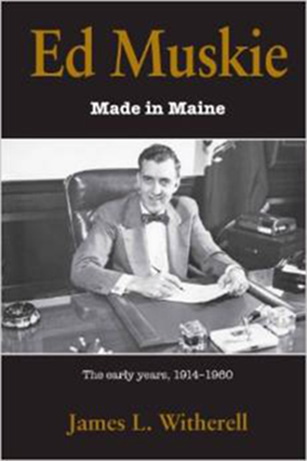Finally in James L. Witherell’s new volume, “Ed Muskie: Made In Maine,” readers, scholars and students begin to see the state’s Democrat incarnate as a man in full. The lively, well-researched and neatly contextualized work joins Muskie’s own 1972 memoirs, “Journeys,” and several useful campaign biographies, along with endless essays, articles and references. Now we are given a solid portrait, up to and through the end of Muskie’s energetic two terms as governor in 1959.
It is curious that it took so long. In the last decade or so, there have been several outstanding biographies of Sen. Margaret Chase Smith, who was the first woman to represent Maine in the U.S. Capitol and served in both houses – rightfully so. Mainers have an enviable track record for electing thoughtful, pragmatic and ultimately powerful individuals to represent them. Sens. George Mitchell, William Cohen and Olympia Snowe come immediately to mind, among others. However, given his vanguard position in restoring the Democratic Party in Maine and northern New England, where it was all but listed as an endangered species, a life of Muskie is a necessity.
Witherell, a trusted scholar and native of Rumford, has previously written three books, including the acclaimed “L.L. Bean: The Man and His Company,” published in 2011. He now shows us the depth of his knowledge and his facility as a writer, providing a portrait of the governor and the times in which he lived.
We follow the son of Stefan Marciszewski, a Polish immigrant, and Josephine Czarnecka, who set up housekeeping and a tailoring shop in Rumford in 1911. The small industrial city in the Maine woods had sprung up overnight at the great falls and included Italians, Polish, Irish and Yankee citizens in a multi-national community. Though the family Americanized the name to Muskie, they were always proud of their Polish background and Catholic religion. In school and at home, Ed was encouraged to excel. Indeed, by working many jobs including dishwasher and bellhop, he managed to get through Bates College during the Depression with private, family and the very first bit of federal assistance.
Witherell does an admirable job of showing the growth of Muskie from a bright but awkward boy to a family man and articulate politician. Ed’s wife, Jane Gray, and their children played sprightly roles. Jane gave up quite a bit for love, leaving the Baptist church and an intensely Republican family to start a Catholic and Democratic brood.
It is difficult to understand how the political landscape of our state changed in the mid-1950s and Witherell is too good a biographer to claim that all the profound changes were due to one man. Muskie rose during the revival of two-party politics, the growth of an education system, and a time when the Legislature met more often and was more beholden to the electorate.
The times were changing. Young men and women, mostly World War II or Korean vets, made use of the G.I. Bill and wanted to raise families in a place where there were competitive wages, good infrastructure and a stable economy.
Witherell explores the contributions made by noted judge and party chairman Frank Coffin, Maine League of Women Voters chairwoman Jean Byers Sampson, other party leaders, and scores of loyal Franco-American city voters in laying the basis for a new generation of populist and liberal Democrats. He chronicles the negativity and “blame it on the victim” rhetoric with which Republican Gov. Burton M. Cross torpedoed his own 1954 campaign.
On the issues of air and water pollution, Witherell explains, Muskie distinguished himself from Cross – and marked out his own legacy – accusing the Republican Party of sticking its head in the sand and ignoring a problem the general public had come to see as serious. This is an excellent book that makes the reader pine for “Ed Muskie, 1960-1996.”
William David Barry is a local historian who has authored/co-authored seven books, including “Maine: The Wilder Side of New England.” He lives in Portland.
Send questions/comments to the editors.



Success. Please wait for the page to reload. If the page does not reload within 5 seconds, please refresh the page.
Enter your email and password to access comments.
Hi, to comment on stories you must . This profile is in addition to your subscription and website login.
Already have a commenting profile? .
Invalid username/password.
Please check your email to confirm and complete your registration.
Only subscribers are eligible to post comments. Please subscribe or login first for digital access. Here’s why.
Use the form below to reset your password. When you've submitted your account email, we will send an email with a reset code.